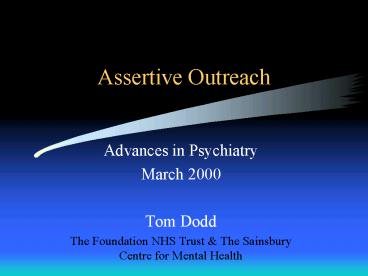Assertive Outreach - PowerPoint PPT Presentation
1 / 16
Title:
Assertive Outreach
Description:
Effective Frameworks in Assertive Outreach. Integrating AO into broader services ... In-vivo treatment & rehabilitation. On-going, not time limited services ... – PowerPoint PPT presentation
Number of Views:92
Avg rating:3.0/5.0
Title: Assertive Outreach
1
Assertive Outreach
- Advances in Psychiatry
- March 2000
- Tom Dodd
- The Foundation NHS Trust The Sainsbury Centre
for Mental Health
2
- Effective Frameworks in Assertive Outreach
- Integrating AO into broader services
- NSF for Mental Health
- Barriers to implementation
- Outcomes and evaluation
3
AO - Who is it for?
- Not for everyone or for every where, nor a recipe
to replace mainstream CMHTs or standard
continuing care case management - But a complementary service to cater to those
individuals with severe disabling mental
illness who do not engage with regular services
- Estimated at around 45 per 100,000 (about 5 of
the adult pop with SMI or 15,000 nationally) - Includes top tier of the CPA, S117 aftercare
- Problems of homelessness substance abuse
4
Effective Frameworks in Assertive Outreach
- Small case loads 110
- Proactive assertive engagement
- Focus on a clearly defined population
- Team approach
- Team is main provider of services
- Crisis intervention
- 24 hour, 7 day week access
5
Effective Frameworks in Assertive Outreach
- Individualised comprehensive treatment
rehabilitation support - In-vivo treatment rehabilitation
- On-going, not time limited services
- Use of evidenced based interventions such as
behavioural family work - Work with dual diagnosis, substance abuse
mental illness
6
NSF - Current situation
- The metal health element of the global burden of
disease is expected to rise from 11 to 15 over
the next 20 years - 5 out of the top 10 leading causes of disability
are psychiatric conditions schizophrenia,
bipolar depression, unipolar depression, alcohol
misuse and obsessive compulsive disorder.
- People with severe mental illness are socially
excluded, finding it difficult to sustain social
and family networks, access education, housing,
gainful employment and healthcare.
7
NSF - Service Principles
- Assessment from a number of perspectives
- Risk management
- Multidisciplinary focus
- Quality of the relationship
- Carer/Family involvement
- Access to Education, Employment and Housing
- Cultural competencies
8
Broader Systems of Care
- NSF demands
- clear functions for CMHTs
- range of interventions
- timely response to crisis
- narrowing the primary / secondary divide
- access to inpatient facilities, or alternative
places for treatment - services which meet local needs
9
Broader Systems of Care
- Who is targeted?
- What are the skills required?
- Who delivers?
- What is the local need?
- Who can we work with?
- Are there already services in place?
10
Process of Care
Helplines GP SW Case Managers
Point of Entry
Spectrum of Need
Forensic Services
CMHTs
Primary Care
Inpatient Facilities
Assertive Outreach
NHS Direct
Non Statutory Agencies
Crisis Resolution
11
Barriers to Implementation
- Lack of fidelity to the key ingredients-
adherence to the practices not just the
principles - AO team not main provider of services
- Teams receive inadequate training, supervision
resourcing - Teams not targeted
- The placing of AO within the spectrum of care
12
Outcomes From PACT Style Assertive Outreach
- Time in hospital reduced
- Improved housing stability
- Modest decrease in symptom severity
- Improved medication adherence
- Modest improvement in functioning
- Moderate improvement in quality of life
- High levels of user and carer satisfaction
13
Outcomes - Admission Rates
14
Outcomes - Length of Stay
Baseline Average Length of Stay 114 days
15
Outcomes - Occupied Bed Days
Baseline OBD 984 days (caseload) per year prior
to engagement
16
Tom Dodd The Foundation NHS Trust The Sainsbury
Centre for Mental Health































